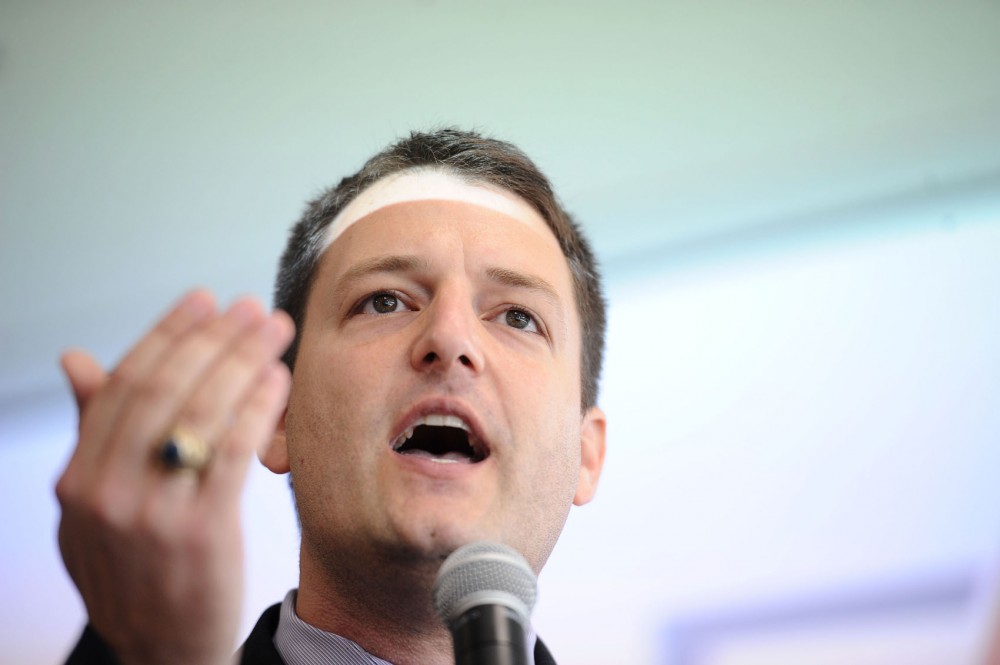Edina native Shannon Awes says her hometown gets a bad rap.
“We get called cake-eaters a lot,” she said, “People from the outside think ‘Oh, they’re all wearing designer jeans,’ but the typical Edina person going to school would be wearing a state hockey T-shirt and jeans and some Sperry’s.”
Despite the stereotypes, Awes wouldn’t want to call anywhere else home.
Edina is one of the western Minneapolis suburbs that makes up the 3rd Congressional District.
This election season, Republican incumbent Rep. Erik Paulsen is facing Democratic newcomer Brian Barnes to represent the wealthiest district in the state.
Awes, a business freshman, is one of about 10,000 University of Minnesota students that come from Hennepin County. The 3rd District covers the western portion of the county, along with a corner of Carver County.
“I love it there; it’s a really great community to grow up in. People are really dedicated to helping you succeed,” Awes said.
Awes, who interned for the Barnes campaign over the summer, said the issues of education and infrastructure funding dominate her district.
She said people generally have the same goals regarding the issues.
Moderation
Although it’s been Republican-represented since 1961, Awes believes her district is becoming more moderate.
“People are becoming more liberal and open about social issues, but economically they’re traditionally a little more conservative,” she said.
Biology freshman Tim Isdahl said in his hometown of Plymouth, people are politically mild and tend to keep their voting preferences to themselves.
“Plymouth is more conservative, because it’s kind of more wealthy. But it’s pretty mixed,” he said.
Isdahl said most political conversations revolve around the upcoming marriage and voter ID amendments.
“There are quite a few yard signs around,” he said, “I haven’t seen many politician yard signs, but there are a lot ‘Vote No’ signs.”
Both Awes and Isdahl plan to return to their home district to vote in November.
Defending his seat
Paulsen has represented the 3rd District since 2009 after defeating Ashwin Madia to replace Jim Ramstad.
A graduate of St. Olaf College, Paulsen began his political career in 1994 when he was elected to the Minnesota House of Representatives. He went on to become the House Majority Leader from 2003 to 2007.
In the U.S. House of Representatives, Paulsen serves on the House Committee on Ways and Means, which handles taxes, trade, health care and economic policy.
After repeated requests, Paulsen’s campaign refused to be interviewed for this article.
He is a part of a congressional bipartisan coalition dedicated to stopping the year-end estate tax hike, which could be damaging to Minnesota farmers, ranchers and small business owners, according to videos on the campaign website.
Paulsen has also been active in promoting small business growth.
This month, he received the Guardian of Small Business Award from the National Federation of Independent Business. He was awarded it in response to his sponsorship of a bill to repeal a tax on medical device makers, which passed in early June, according to a press release.
Jake Severance, co-chair of the Congressional District 3 Republicans, said Minnesota voters care about education, along with the federal and state budgets.
“Paulsen has a pretty strong fiscal record in the House,” Severance said. “He has pretty much established where he stands, people know who he is. His record is out there.”
Severance said Paulsen’s fiscal policies serve his district, where voters are concerned about government spending.
“I think he’s done well for us in the House, and I think he’ll continue to do so.”
The Newcomer
Barnes, unlike his opponent, has built his career outside of politics.
A graduate of the U.S. Merchant Marine Academy, Barnes served as a Lt. Commander in the U.S. Navy Reserve for 11 years.
He is currently a marketing and sales manager for Cummins Onan, a Fortune 200 company.
“He has a real knack for talking to people, listening to their needs and trying to provide solutions,” said Craig Gelderman, a marketing communications specialist for Cummins.
Gelderman, who worked with Barnes for almost five years, said Barnes was always looking for new ideas and new ways to present them.
“He is very personable and action-oriented,” Gelderman said. “He’s not afraid to step into areas that may not be totally defined and try to figure something out.”
After following last year’s debt-ceiling debate, Barnes decided to get involved in politics out of “a frustration with a system that’s broken.”
He was especially disappointed in Paulsen’s vote against raising the debt ceiling, which Barnes said was a display of choosing “party over country.”
Education is a major platform for Barnes. He believes it is time for lawmakers to start investing in education once again, which he believes Paulsen has invested away from.
“My opponent voted for the [Paul] Ryan Budget, which carves $115 billion out of education over 10 years. In 2009 he voted against student aid and for big banks. There’s a problem with that,” he said.
To solve what he calls a congressional “leadership problem,” Barnes believes voters need to choose leaders with specific skills to help the country progress.
“We need people who come from the business world, from the military world,” he said, “We need people who have those leadership skill sets to take the country forward and to say ‘you obviously don’t know what you’re doing, you should probably not go back to D.C.’”








